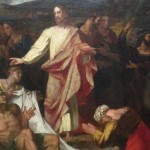
In our journey through Henri Nouwen’s Reaching Out, we have discussed the transition from loneliness to solitude, and the transition from hostility to hospitality. In these last few weeks before Easter, we come to what is at once both the most difficult and the most fundamental of the movements of the spirit discussed by Nouwen, and this is the movement from illusion to prayer. Of this Nouwen notes:
The movement from illusion to prayer undergirds and makes possible the movements from loneliness to solitude and from hostility to hospitality and leads us to the core of the spiritual life.
This “first and final” movement is so central to our spiritual life that it is very hard to come in touch with it, to get a grasp on it, to get hold of it, or even – to put a finger on it. Not because this movement is vague or unreal, but because it is so close that it hardly allows the distance needed for articulation and understanding. Maybe this is the reason why the most profound realities of life are the easiest victims of trivialization. (Chapter 7)
My co-blogger Kevin and I have been discussing particularly this last point, the way that prayer is so easily trivialized and commodified such that it is difficult even to begin approaching it as a topic. We want to talk about prayer, depth, contemplation, real connection, and life, but in an age as interested in spiritual success as it is in all other kinds of success, these words have become just another set of terms in the self-help manuals, so caricatured that many of us have given up hope of finding anything in them at all. I recall a friend of mine who didn’t like to go out to social events because she couldn’t stand all the “caring people.” What she meant of course were not people actually being caring, but people with a certain kind of solicitous concern, just enough to make one anxious but not quite enough to compel the inquirer to enter deeply into the suffering and awkwardness of another. And it is not only words that suffer such cheapening, but the perceptions of experiences themselves; Nouwen describes how
Newspaper interviews with monks who have given their life to prayer in silence and solitude out of a burning love for God, usually boil down to silly stories about changes in regulations and seemingly strange customs. Questions about the “why” of love, marriage, the priesthood or any basic life decision usually lead to meaningless platititudes, a lot of stuttering and shaking of shoulders. Not that these questions are unimportant, but their answers are too deep and too close to our innermost being to be caught in human words. (Chapter 7)
All this leads Nouwen to conclude that, rather than something of a value-added supplement to life, prayer is in fact a great unmasking, a dropping of the pretenses and vapidities and banalities that hang about these words, experiences, and concepts. It is not a matter of “doing prayer” as though we were the primary actors; rather, it is a matter of doing away with whatever illusions we hide behind, and opening our heart to a space of prayer that is already there, a divine gift waiting to be received. Of course, the problem is that, when our ingenious hearts can turn anything into a means of hiding from God – including spiritual experience – we are left wondering what to do.
As Nouwen puts it, “we cannot plan, organize or manipulate God” (Chap. 7) – to think otherwise must be illusion. Yet “without a careful discipline, we cannot receive him either” (Chap. 7) – without discipline, we will be left to the caprices of our own hearts. Indeed, it is this simultaneous recognition of both our own spiritual poverty and our need to receive prayer through discipline that we are attempting to help foster here at the Inner Room. Next week, in the final post of this series, we will take a closer look at what precisely Nouwen means by such disciplined poverty of spirit.
















